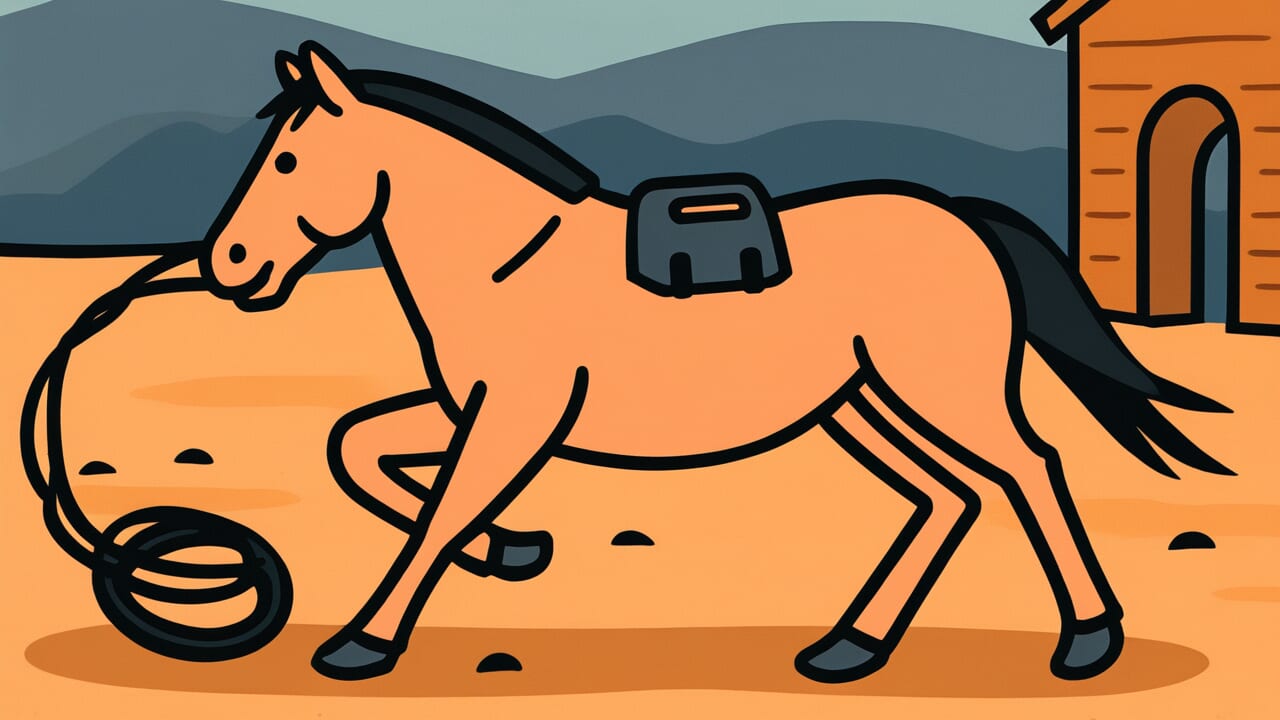How to Read “A discarded whip for a bare horse”
Hadaka uma no sute muchi
Meaning of “A discarded whip for a bare horse”
“A discarded whip for a bare horse” is a metaphor for losing everything and acting recklessly in desperation.
This proverb describes how people lose their ability to think clearly when cornered. They end up taking reckless actions.
Just as whipping a bare horse is pointless without proper equipment to control it, people in desperate situations often take meaningless actions that can’t be undone.
This saying is used when someone who failed in business gambles away their last savings. It also applies when someone who lost their reputation takes actions that damage it further.
These are examples of destructive behavior driven by lost reason.
Even today, we see people lose their composure under pressure. They make choices that worsen their situation.
This proverb accurately captures this psychological state. It remains meaningful in our modern world.
Origin and Etymology
No clear historical records explain the origin of this proverb. However, we can learn much from examining its components.
“Bare horse” refers to a horse without saddle, stirrups, or any equipment. It represents a state of having lost all tools, or having nothing from the start.
“Discarded whip” points to the act of wielding a whip that no longer serves any purpose.
Riding a horse normally requires tools like a saddle and reins. But when you’ve lost everything and sit on a bare horse, whipping it won’t help you control it.
Yet continuing to whip shows not rational judgment but a state of desperation.
Some believe this expression emerged from common people’s experiences during the Edo period. Back then, horses were precious property.
Acquiring a full set of horse equipment was not easy. The image of someone who lost everything, holding only a whip and acting recklessly, must have left a strong impression on people.
The structure of this saying suggests it’s rooted in everyday life. It expresses recklessness in a state of having nothing left to lose, using the familiar image of a horse.
Usage Examples
- Even though his company was on the verge of bankruptcy, he acted like “a discarded whip for a bare horse” and got involved in a risky investment scheme
- His behavior after losing everything was like “a discarded whip for a bare horse,” and he wouldn’t listen to anyone’s advice
Universal Wisdom
“A discarded whip for a bare horse” sharply captures a psychological mechanism that humans display when pushed to their limits.
As people lose important things one after another, they simultaneously lose their composure and judgment. They try to respond carefully to the first loss.
But as losses accumulate, they easily fall into a “whatever happens, happens” mindset. This might be a form of self-defense instinct.
Throwing everything away feels easier than continuing to feel pain.
This proverb has been passed down through generations because this human weakness is universal across time. When cornered, people don’t always make wise choices.
Rather, everyone carries within them the danger of crossing the final line the moment they feel they have nothing left to lose.
Our ancestors expressed this dangerous psychological state through the metaphor of a horse. The meaninglessness of whipping a horse you can’t control mirrors the meaninglessness of actions taken without reason.
This proverb continues to warn us about the terror of human desperation and the path to destruction it creates.
When AI Hears This
Systems thinking researcher Donella Meadows pointed out that “where you apply force” is critically important for changing systems. This proverb shows exactly the opposite: a point where applying force no longer means anything.
Systems have “points of no return.” For example, glacier melting accelerates on its own beyond a certain temperature and can’t be stopped.
Corporate bankruptcy works the same way. Once cash flow drops below a certain line, any effort becomes futile.
Whipping a bare horse represents a system that has passed this point of no return.
What’s interesting is that while most people focus on “amount of effort,” systems thinking considers “timing of intervention” as what makes effectiveness 100 times greater or zero.
The same effort has great effect when used while the horse can still run. After it collapses, it becomes completely meaningless.
We see the same structure in modern climate change responses. Scientists warn about “tipping points,” critical thresholds beyond which warming becomes irreversible.
Constantly monitor the system’s state and take action while intervention is still effective. This is the core of systems thinking and the wisdom this proverb has conveyed for over 2,000 years.
Lessons for Today
This proverb teaches us the importance of having courage to stop before being cornered.
In life, everyone faces difficult situations. At such times, you might feel “I have nothing left to lose.”
However, it’s important to realize you haven’t actually lost everything. Health, relationships, possibilities for the future—these precious but less visible things are still in your hands.
Modern society offers many situations that could lead to desperation. Social media controversies, investment losses, relationship troubles.
In such moments, remember this proverb. Before taking reckless action, take a deep breath and talk to someone you trust.
Just that can start changing the situation.
Failure is not the end. But if you act recklessly in desperation, you invite the true end yourself.
No matter how painful things get, protect that final line of composure. That is your most precious asset for standing up again.



Comments